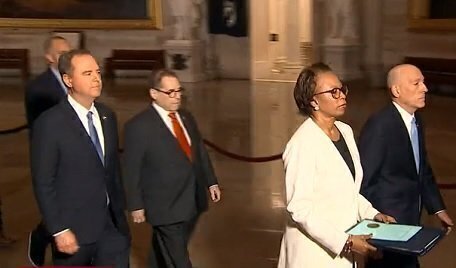On Wednesday, the House of Representatives formally delivered two articles of impeachment against President Donald J. Trump to the Senate. The next steps, according to precedent, will lay the groundwork for a trial in the Senate.
 Speaker Nancy Pelosi named seven House members as impeachment managers to prosecute the case in the Senate. The Speaker had delayed the final parts of the House impeachment process since December 18, 2019. Once impeachment managers were chosen on Wednesday, the House passed and transmitted to the Senate a separate resolution formally stating the impeachment charges and the names of the trial managers.
Speaker Nancy Pelosi named seven House members as impeachment managers to prosecute the case in the Senate. The Speaker had delayed the final parts of the House impeachment process since December 18, 2019. Once impeachment managers were chosen on Wednesday, the House passed and transmitted to the Senate a separate resolution formally stating the impeachment charges and the names of the trial managers.
The Senate’s obligation will be to notify the House impeachment managers of the starting date of Senate proceedings. When the Senate trial begins, Chief Justice John G. Roberts, Jr. of the Supreme Court will preside over the proceedings according to Article I, Section 3 of the Constitution.
Senate Majority Leader Mitch McConnell said on Wednesday that the Senate will receive the House impeachment managers at 12 p.m. on Thursday and Senate President Pro Tempore Chuck Grassley will swear in Chief Justice Roberts at 2 p.m.
Under Article I, Section 3 of the Constitution, the Senate has the sole power to conduct impeachment trials. Standing rules first adopted for President Andrew Johnson’s impeachment trial in 1868 (and updated several times since then) will be used to conduct the trial.
Early in the proceedings, the House managers appear in the Senate and formally present the impeachment articles to be tried. The Senate will issue a writ of summons asking the President or his counsel to appear before it and will also set a trial date. The Senate then forms itself as a court of impeachment, with Senators taking a special oath administered by Chief Justice Roberts to “do impartial justice.”
The trial will proceed as the House managers and defense counsel argue their cases, and witnesses are called to testify. The Senate also needs to decide how it will handle testimony from witnesses.
The Chief Justice will rule on questions about evidence and procedure, subject to being overruled by a majority vote of the whole Senate under Senate precedent. (In some cases, the Chief Justice could consult the Senate Parliamentarian about questions related to Senate procedural rules during the impeachment process.)
After testimony and arguments have concluded, the Senate will meet in a closed session to vote on the charges. Per Article I, Section 3, two-thirds of the Senators present must vote to convict the President on an article of impeachment.
If the President is convicted on any article, the Chief Justice will announce a judgment of conviction and removal.
In the Constitution
The House's Impeachment Powers
The Senate's Impeachment Trial Role
The Rules for Impeachment Proceedings
Scott Bomboy is the editor in chief of the National Constitution Center.







